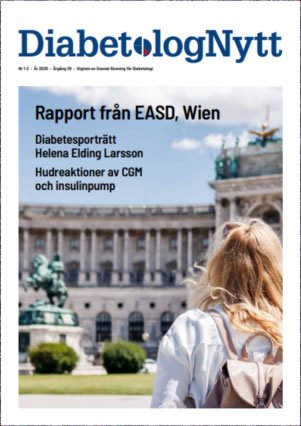”These findings suggest that to safely follow current guidelines, young adults who transition to adult care require additional support to maximize their health outcomes that will extend for some time beyond the transfer to an adult provider,” the researchers reported online in Pediatrics.
Various practice guidelines recommend making the transition to adult care from ages 18 to 21.
One of the important implications of the current study ”is that perhaps we as pediatric practitioners are not doing too badly even with our young adult patients, and that we should perhaps not hasten a transition,” according to Steven Willi, MD, director of the Diabetes Center for Children at the Children’s Hospital of Philadelphia.
”Another implication might be that adult practices should perhaps make some adjustments to accommodate these young adults with diabetes,” he said in an interview.
The researchers examined data from 185 adolescents who were recently diagnosed with type 1 diabetes when they entered the SEARCH for Diabetes in Youth Study, which enrolled patients who were ages 13 to 19 when they received their diagnosis. All of the patients in the current analysis were receiving care from a pediatric endocrinologist or pediatrician at baseline and were followed up when they were 18 or older.
The average age was 15 at diagnosis, 16 at study baseline, and 20.5 at follow-up. Poor glycemic control — defined as a hemoglobin A1c of 9% or higher — was present in 11% of patients at baseline and in 45% at follow-up.
Overall, 57% of the patients had transitioned to adult diabetes at follow-up; the switch occurred at a median estimated age of 20.1 years. About three-quarters (75%) of the patients had left pediatric care before turning 21, as recommended in practice guidelines.
Those who made the transition were older, had a lower baseline hemoglobin A1c, and had parents with less education compared with those who did not make the transition.
Why a transition to adult care was associated with a greater likelihood of poor glycemic control remains an open question, according to the researchers.
Willi speculated that it might have to do with the level of support given in a pediatric versus an adult practice. Adult practices might provide less access to diabetes education services and less psychosocial support than pediatric practices, he said, noting that parents often accompany patients in a pediatric setting.
Nonwhite ethnicity also was associated with a greater likelihood of poor glycemic control at follow-up (OR 3.44, 95% CI 1.17 to 10.1).
”The implication is that perhaps our practices need to make some special concessions or adaptations for these minority young adults as they transition from childhood into adult care,” Willi said.
The SEARCH for Diabetes in Youth Study is funded by the CDC and supported by the National Institute of Diabetes and Digestive and Kidney Diseases.
The authors reported that they had no conflicts of interest.
Primary source: Pediatrics
Asbtract
Transition From Pediatric to Adult Care for Youth Diagnosed With Type 1 Diabetes in Adolescence
- Debra S. Lotstein, MD, MPHa,
- Michael Seid, PhDb,
- Georgeanna Klingensmith, MDc,
- Doug Case, PhDd,
- Jean M. Lawrence, ScD, MPH, MSSAe,
- Catherine Pihoker, MDf,
- Dana Dabelea, MD, PhDg,
- Elizabeth J. Mayer-Davis, PhDh,
- Lisa K. Gilliam, MD, PhDi,
- Sarah Corathers, MDj,
- Giuseppina Imperatore, MD, PhDk,
- Lawrence Dolan, MDj,
- Andrea Anderson, MSd,
- Ronny A. Bell, PhDl,
- Beth Waitzfelder, PhDm,
- for the SEARCH for Diabetes in Youth Study Group
+ Author Affiliations
aDepartment of Pediatrics, David Geffen School of Medicine at University of California Los Angeles, Los Angeles, California;
bDivision of Pulmonary Medicine and Anderson Center for Health Systems Excellence, Cincinnati Children’s Hospital Medical Center, Cincinnati, Ohio;
cBarbara Davis Center, University of Colorado Denver School of Medicine, Aurora, Colorado;
Departments of dBiostatistical Services, and
lEpidemiology and Prevention, Wake Forest University School of Medicine, Winston-Salem, North Carolina;
eDepartment of Research and Evaluation, Kaiser Permanente Southern California, Pasadena, California;
Departments of fPediatrics, and
iMedicine, University of Washington, Seattle, Washington;
gDepartment of Epidemiology, Colorado School of Public Health, Denver, Colorado;
hDepartment of Nutrition, Gillings School of Global Public Health and School of Medicine, University of North Carolina, Chapel Hill, North Carolina;
jDivision of Endocrinology, Cincinnati Children’s Hospital Medical Center and University of Cincinnati, Cincinnati, Ohio;
kDivision of Diabetes Translation, Centers for Disease Control and Prevention, National Center for Chronic Disease Prevention and Health Promotion, Atlanta, Georgia;
mCenter for Health Research Hawaii, Kaiser Permanente Hawaii, Honolulu, Hawaii
Abstract
OBJECTIVE: Youth with type 1 diabetes mellitus are at risk for poor glycemic control as they age into adulthood. The aim of this study was to describe sociodemographic and clinical correlates of poor glycemic control associated with the transfer of care from pediatric to adult diabetes providers among a cohort of youth with type 1 diabetes diagnosed in adolescence.
METHODS: Analyses included 185 adolescent participants with recently diagnosed type 1 diabetes in the SEARCH for Diabetes in Youth Study with pediatric care at baseline who were age ≥18 years at follow-up. Demographic and clinical factors were measured by survey and laboratory results. Survival analysis was used to estimate the age of transition. Logistic regression analysis assessed the association of demographic and clinical factors with the transition of care and poor glycemic control at follow-up.
RESULTS: Fifty-seven percent of participants had transitioned to adult diabetes care providers by the follow-up visit. The estimated median age of transition of care was 20.1 years (95% confidence interval 19.8–20.4). Older age, lower baseline glycosylated hemoglobin, and less parental education were independently associated with increased odds of transition. The odds of poor glycemic control at follow-up were 2.5 times higher for participants who transitioned to adult care compared with those who remained in pediatric care.
CONCLUSIONS: Transferring from pediatric to adult care, experienced by more than half the sample, was associated with an increased risk of poor glycemic control at follow-up. These findings suggest that young adults need additional support when moving to adult care.
Nyhetsinfo
www red DiabetologNytt

